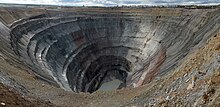
Back Extractivisme Catalan Extraktivismus Czech Extraktivismus German Extractivismo Spanish Ekstraktivismi Finnish Extractivisme French Estrattivismo Italian Extrativismo Portuguese Hafriyatçılık Turkish


Extractivism is the removal of natural resources particularly for export with minimal processing.[1][2][3] This economic model is common throughout the Global South and the Arctic region, but also happens in some sacrifice zones in the Global North in European extractivism.[3][4][5] The concept was coined in Portuguese as "extractivismo" in 1996 to describe the for-profit exploitation of forest resources in Brazil.[6][A]
Many actors are involved in the process of extractivism. These mainly include transnational corporations (TNCs) as the main players,[citation needed]but are not limited to them, because they also include the government and some (chiefly economic) community members. Trends have demonstrated that countries do not often extract their own resources;[need quotation to verify] extraction is often led from abroad.[8] These interactions have contributed to extractivism being rooted in the hegemonic order of global capitalism.[9] Extractivism is controversial because it exists at the intersection where economic growth and environmental protection meet. This intersection is known as the green economy. Extractivism has evolved in the wake of neo-liberal[weasel words] economic transitions to become a potential avenue for development to occur.[10] This development occurs through stabilizing growth rates and increasing direct foreign investment.[11]
However, while these short-term economic benefits can be substantial, extractivism as a development model is often critiqued for failing to deliver the improved living conditions it promises and failing to work collaboratively with already existing programs, therefore inflicting environmental, social and political consequences.[12][B]
Environmental concerns of extractivism include; climate change, soil depletion, deforestation, loss of food sovereignty, declining biodiversity and contamination of freshwater.[14] Social and political implications include violation of human rights, unsafe labour conditions, unequal wealth distribution and conflict.[15] As a result of this, extractivism remains a prominent debate in policy related discourse because while it sometimes delivers high economic gains in the short term, it also poses social and environmental dangers. Case studies in Latin America demonstrate these policy gaps.
- ^ Szeman, Imre; Wenzel, Jennifer (2021). "What do we talk about when we talk about extractivism?". Textual Practice. 35 (3): 505–523. doi:10.1080/0950236X.2021.1889829. S2CID 233128636.
- ^ Chagnon, Christopher W.; Durante, Francesco; Gills, Barry K.; Hagolani-Albov, Sophia E.; Hokkanen, Saana; Kangasluoma, Sohvi M. J.; Konttinen, Heidi; Kröger, Markus; LaFleur, William; Ollinaho, Ossi; Vuola, Marketta P. S. (2022). "From extractivism to global extractivism: the evolution of an organizing concept". The Journal of Peasant Studies. 49 (4): 760–792. doi:10.1080/03066150.2022.2069015.
- ^ a b Acosta, Alberto (2013). "Extractivism and neo-extractivism: two sides of the same curse" (PDF). Beyond Development: Alternative Visions from Latin America.
- ^ Wilson, E.; Stammler, F. (2016). "Beyond extractivism and alternative cosmologies: Arctic communities and extractive industries in uncertain times". The Extractive Industries and Society, 3 (1), 1-8.
- ^ Sörlin, S., Dale, B., Keeling, A., & Larsen, J. N. (2022). "Patterns of Arctic Extractivism: Past and Present" in Resource Extraction and Arctic Communties: The New Extractivist Paradigm.
- ^ Duc, Marine (2017). "Extractivisme". Géoconfluences (in French). Retrieved 2023-01-29.
- ^ Domínguez Martín, Rafael (2021). "El extractivismo y sus despliegues conceptuales" [Extractivism and its conceptual deployments]. Revista Territorios y Regionalismos (in Spanish). 4. University of Concepción: 1–26.
- ^ Gizbert-Studnicki, D (2016). "Canadian Mining in Latin America". Canadian Journal of Latin American and Caribbean Studies. 41: 95–113. doi:10.1080/08263663.2015.1134498. S2CID 155769679.
- ^ Fabricant. "Moving Beyond the Extractivism Debate". p. 40.
- ^ Burchardt, H; Dietz, K (2014). "(Neo)-extractivism – a new challenge for development theory from Latin America". Third World Quarterly. 24 (3): 468. doi:10.1080/01436597.2014.893488. S2CID 153475041.
- ^ Burchardt, H. "Neo-extractivism – a new challenge". p. 469.
- ^ Lopez, E; Vertiz, F (2015). "Extractivism, Transnational Capital and Subaltern Struggles in Latin America". Latin American Perspectives. 42 (5): 156. doi:10.1177/0094582X14549538. hdl:11336/54666. S2CID 154338050 – via Scholars Portal.
- ^ Cori, Andrea; Monni, Salvatore (2015-12-01). "Neo-extractivism and the Resource Curse Hypothesis: Evidence from Ecuador". Development. 58 (4): 594–607. doi:10.1057/s41301-016-0053-x. ISSN 1461-7072. S2CID 90808149.
- ^ Burchardt. "Neo-extractivism". p. 469.
- ^ Burchardt. "Neo-extractivism". p. 471.
Cite error: There are <ref group=upper-alpha> tags or {{efn-ua}} templates on this page, but the references will not show without a {{reflist|group=upper-alpha}} template or {{notelist-ua}} template (see the help page).
© MMXXIII Rich X Search. We shall prevail. All rights reserved. Rich X Search